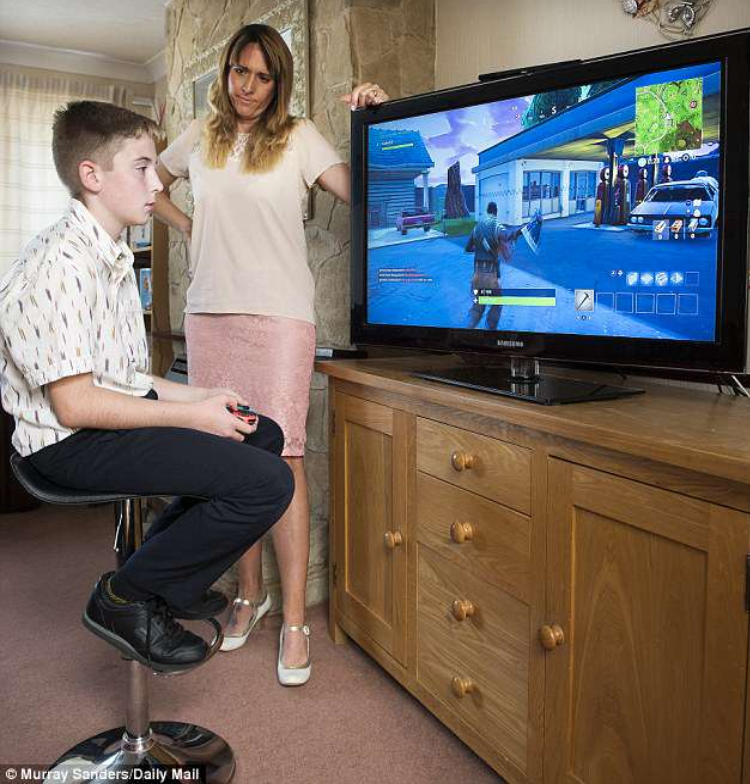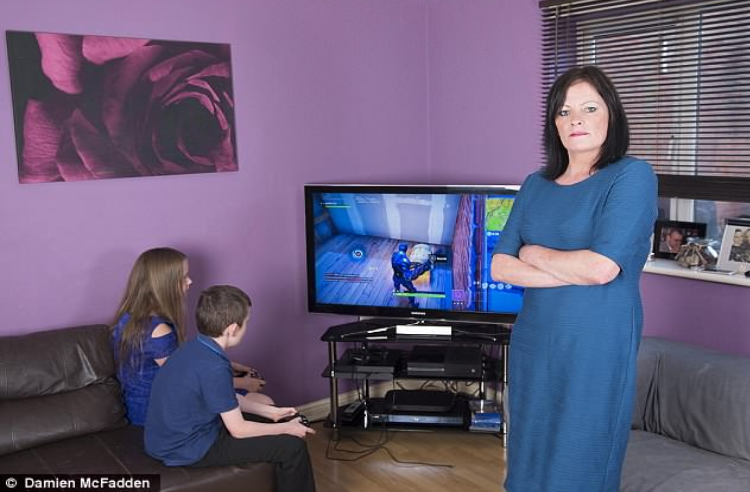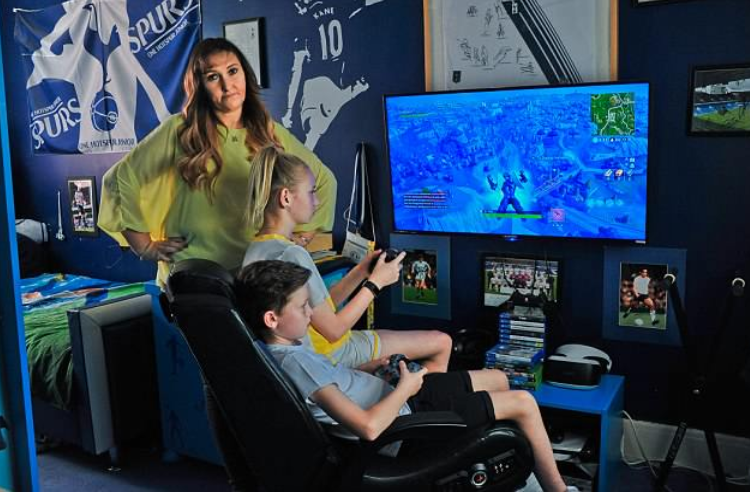Video games have long been known for negatively engaging the youth but a certain game, unlike the other ones, seems to have hooked young children in a way never seen before!
The game Fortnite: Battle Royale has caused horrific changes in young boys turning them into nightmares, parents say.
The addicting game, since launching its free version 6 months ago, is played by more than 125 million people across the globe— making it one of the biggest computer games of all time and earning its maker, the US software company Epic Games, around £230 million a month.
7-year-old Dominique Brucher from Purley, South London, doesn’t even bother to change his school uniform upon returning from the school and once he starts playing the game, he becomes totally oblivious to his surroundings.
‘I killed him,’ the little boy says emotionlessly. ‘Wow, these are good guns: sniper rifles. I now need to get a smaller gun to shoot at close range.’
His mother, Ella, a 32-year-old administrator, feels she has lost her son ever since he started playing the game five months ago.
‘He’s obsessed,’ she says. ‘It’s all he wants to do. He gets up early at the weekend so he can play all day — for six hours sometimes. If he’s not playing it, he’s watching videos about it.’
But the question is why doesn’t she stop her boy if she feels he is addicted to the game. ‘I let him play because it gives him a chance to chat with friends,’ she says.
However, Ella admits that the game has created a lot of problems in her life. ‘If we tell him to finish, then he can get really angry because he doesn’t want to. I also don’t let him play on a school day unless as a rare treat.’
Ella is not the only mother who feels she has lost her child to the game. A lot of other mothers also feel the same way!
38-year-old housewife Amanda Snow, from Southampton, has 4 sons and like many others, her 13-year-old boy Luke is hooked up by the game.

Luke explains: ‘It’s my favorite game so far. It’s really good and I think about it when I’m not playing it, of ways to buy things to help me win, with my paper round money.’
Amanda says he has become a ‘different child’ ever since he started playing Fortnite 3 months ago.
‘He was such a lovely boy, but this game has turned him into a nightmare.
‘He would sit on it all weekend, but we drag him out to a park or somewhere, though he doesn’t want to come with us.
‘I hate what this game has done to him, but how can I stop him when he would be the only one at school not playing it?’
Zoe Godber, a 47-year-old bartender from Nottinghamshire, is also horrified by the changes, the devilish game has caused in her 9-year-old son, Jacob.

Zoe says: ‘He’s addicted to Fortnite. Before, he would go out and play — now, he just wants to sit in his room.’
When little Jacob isn’t playing the game, he spends hours watching YouTube videos of professional Fortnite gamers like the other amateur players.
Zoe also reveals how her son occasionally goes crazy while playing the game, and how he once smashed his screen out of anger.
‘He’s been shouting, screaming, punching things. He hit the TV with the controller and smashed the screen because he was so frustrated when he lost.’
‘People may ask why don’t I just take it away, but the truth is I can’t calm him down or control him without it. I can get him to do things if I say he can play Fortnite as a reward.’
When asked why he smashed the television screen, Jacob says: ‘People were killing me and it made me mad. I play every day and it sometimes makes me late for school.’
A 9-year-old girl who used to play Fortnite for up to 10 hours a day was sent to rehab after her parents found her playing the game in the middle of the night, sitting on a urine-soaked cushion, as she’d been too engrossed to go to the toilet.
The players can’t pause the game as leaving in the middle means you die. The game’s premise is simple yet interesting: 100 players who land on a dystopian island have to kill each other to be the last one alive.
There are weapons hidden around the island including guns, crossbows, and grenade launchers, which must be discovered by the players so as to kill the others.
The players can play alone by joining an online ‘squad’ or team up with their friends, communicating through headsets and working together for killing everyone else and building a ‘fort’ for defending themselves— hence the game is named Fortnite.
Although the game is free, players can buy add-ons for various purposes by linking the game to credit cards which, of course, belong to their unaware parents.
Roz Page, a 49-year-old dog-boarding business owner, is one of the mothers who experienced it. Her 10-year-old son Matthew spent £140 on buying extras, which she only realized after receiving her credit card bill.

‘All he had to do was press a button and he was able to buy weapons and outfits. I had no idea he could do this,’ Roz says.
‘I don’t think he understood what he was doing. I showed him my purse and explained how it’s the same as taking money out of it. It’s stealing from me.’
Matthew also got addicted to the game ever since he started playing in January.
‘We were hoping it was going to just be a phase, but there’s something different about this game,’ says Roz.
‘I have tried to play it and don’t get it. I don’t like the idea you’re killing somebody. You don’t see the blood and gore you would with other games, such as Grand Theft Auto or Call Of Duty, but there’s no ending to it.
‘I remember games he’s played before, like Super Mario, and they have an end. This just continues forever.
‘I’d say 95 per cent of his school friends are on it. I don’t want him to feel left out.
‘However, I am becoming increasingly concerned about his behavior. I’ve spoken to his teachers. They say other parents are worried and, although Matthew is doing well at school, I need to consider the long-term implications. What impact is this having on his mind? The last thing he sees before he goes to sleep is that game.’
Like the other mothers, Roz has also noticed a change in her son’s behavior.
‘He has started to get really angry — it’s not like him. He answers back and has mood swings.
‘We try to make sure he does other things but, if I shout out saying that dinner’s ready, no one answers.
‘He’s got his headphones on and curtains shut on a sunny day. It’s horrendous.
‘I discovered he was getting up early at the weekend and spending hours on it in his room. Now, I don’t let him play before 10am but, if I try to stop him completely, I end up with a very upset little boy.’
Matthew says: ‘I like playing Fortnite the most out of everything. It’s fun because it never ends and I like playing it with friends. When Mum tells me to come off, I get angry and scream because I don’t want to stop.’

Parenting coach Elizabeth O’Shea says children having too much screen time is one of the biggest problems she encounters and, recently, Fortnite is being the cause behind it.
‘This is the first generation this has happened to,’ Elizabeth says. ‘If a child doesn’t learn how to manage their online use, they’re going to go into adulthood not knowing how to have relationships and without social skills.
‘We know computer games are addictive. In the child’s brain, there’s a dopamine hit every time they achieve something and that’s more exciting than boring old life. It’s the same as a drug or alcohol addiction.’
Elizabeth also explains what parents should do to stop their children from getting obsessed with video gaming.
‘They shouldn’t have computers in their rooms at all. It’s like leaving a bottle of alcohol beside an alcoholic’s bed and saying: ‘I trust you to not drink it,’ she says.
However, according to Andrew James, computer game expert, Fortnite or any other game is not to blame. ‘Parents need to stop blaming computer games for the sins of their failings,’ he says.
‘If they think their child has a problem and is playing too much, then stop them. Take away the console. Yes, it will be tough and there will be tears, but isn’t that what parenting is about — setting boundaries and following them through?
‘It’s about balance. There’s nothing wrong with playing a game in moderation, but obviously, if it’s affecting sleep or leading to an inactive lifestyle, then parents need to step in.’


